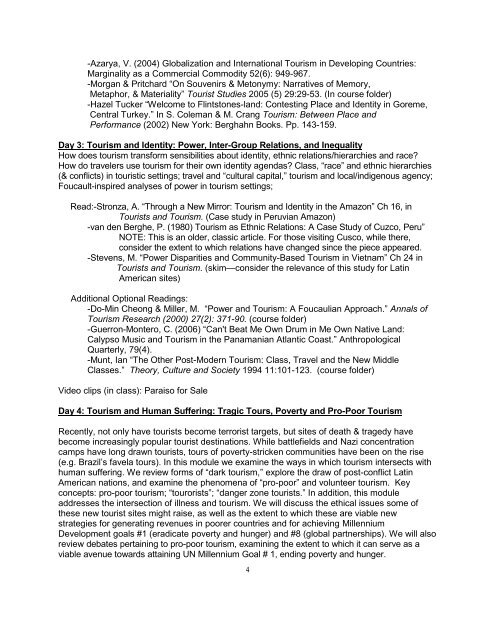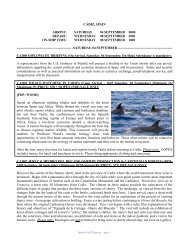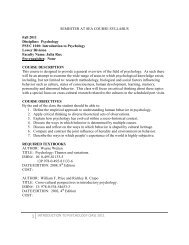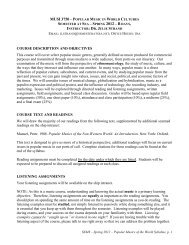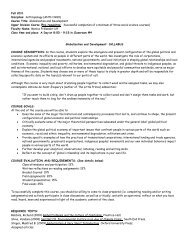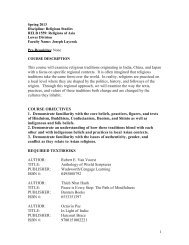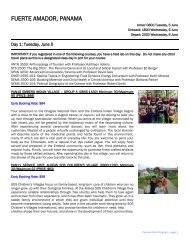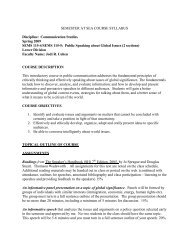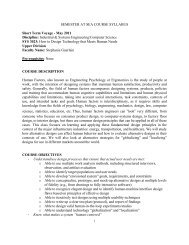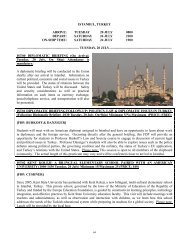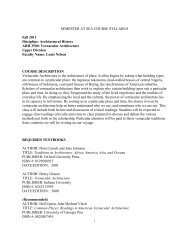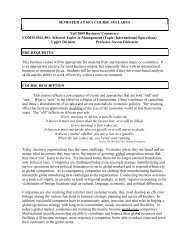ANTH 3559 - University of Virginia
ANTH 3559 - University of Virginia
ANTH 3559 - University of Virginia
Create successful ePaper yourself
Turn your PDF publications into a flip-book with our unique Google optimized e-Paper software.
-Azarya, V. (2004) Globalization and International Tourism in Developing Countries:<br />
Marginality as a Commercial Commodity 52(6): 949-967.<br />
-Morgan & Pritchard “On Souvenirs & Metonymy: Narratives <strong>of</strong> Memory,<br />
Metaphor, & Materiality” Tourist Studies 2005 (5) 29:29-53. (In course folder)<br />
-Hazel Tucker “Welcome to Flintstones-land: Contesting Place and Identity in Goreme,<br />
Central Turkey.” In S. Coleman & M. Crang Tourism: Between Place and<br />
Performance (2002) New York: Berghahn Books. Pp. 143-159.<br />
Day 3: Tourism and Identity: Power, Inter-Group Relations, and Inequality<br />
How does tourism transform sensibilities about identity, ethnic relations/hierarchies and race?<br />
How do travelers use tourism for their own identity agendas? Class, “race” and ethnic hierarchies<br />
(& conflicts) in touristic settings; travel and “cultural capital,” tourism and local/indigenous agency;<br />
Foucault-inspired analyses <strong>of</strong> power in tourism settings;<br />
Read:-Stronza, A. “Through a New Mirror: Tourism and Identity in the Amazon” Ch 16, in<br />
Tourists and Tourism. (Case study in Peruvian Amazon)<br />
-van den Berghe, P. (1980) Tourism as Ethnic Relations: A Case Study <strong>of</strong> Cuzco, Peru”<br />
NOTE: This is an older, classic article. For those visiting Cusco, while there,<br />
consider the extent to which relations have changed since the piece appeared.<br />
-Stevens, M. “Power Disparities and Community-Based Tourism in Vietnam” Ch 24 in<br />
Tourists and Tourism. (skim—consider the relevance <strong>of</strong> this study for Latin<br />
American sites)<br />
Additional Optional Readings:<br />
-Do-Min Cheong & Miller, M. “Power and Tourism: A Foucaulian Approach.” Annals <strong>of</strong><br />
Tourism Research (2000) 27(2): 371-90. (course folder)<br />
-Guerron-Montero, C. (2006) “Can't Beat Me Own Drum in Me Own Native Land:<br />
Calypso Music and Tourism in the Panamanian Atlantic Coast.” Anthropological<br />
Quarterly, 79(4).<br />
-Munt, Ian “The Other Post-Modern Tourism: Class, Travel and the New Middle<br />
Classes.” Theory, Culture and Society 1994 11:101-123. (course folder)<br />
Video clips (in class): Paraiso for Sale<br />
Day 4: Tourism and Human Suffering: Tragic Tours, Poverty and Pro-Poor Tourism<br />
Recently, not only have tourists become terrorist targets, but sites <strong>of</strong> death & tragedy have<br />
become increasingly popular tourist destinations. While battlefields and Nazi concentration<br />
camps have long drawn tourists, tours <strong>of</strong> poverty-stricken communities have been on the rise<br />
(e.g. Brazil’s favela tours). In this module we examine the ways in which tourism intersects with<br />
human suffering. We review forms <strong>of</strong> “dark tourism,” explore the draw <strong>of</strong> post-conflict Latin<br />
American nations, and examine the phenomena <strong>of</strong> “pro-poor” and volunteer tourism. Key<br />
concepts: pro-poor tourism; “tourorists”; “danger zone tourists.” In addition, this module<br />
addresses the intersection <strong>of</strong> illness and tourism. We will discuss the ethical issues some <strong>of</strong><br />
these new tourist sites might raise, as well as the extent to which these are viable new<br />
strategies for generating revenues in poorer countries and for achieving Millennium<br />
Development goals #1 (eradicate poverty and hunger) and #8 (global partnerships). We will also<br />
review debates pertaining to pro-poor tourism, examining the extent to which it can serve as a<br />
viable avenue towards attaining UN Millennium Goal # 1, ending poverty and hunger.<br />
4


